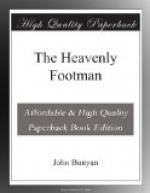Title: The Heavenly Footman
Author: John Bunyan
Release Date: October 14, 2004 [eBook #13750]
Language: English
Character set encoding: ISO-646-us (us-ASCII)
***Start of the project gutenberg EBOOK the heavenly Footman***
E-text prepared by Cori Samuel and the Project Gutenberg Online Distributed Proofreading Team from digital images provided by Internet Archive Children’s Library and the University of Florida
Notes: Project Gutenberg also has an HTML version
of this
file which
includes the original illustrations.
See 13750-h.htm
or 13750-h.zip:
(http://www.gutenb
erg.net/dirs/1/3/7/5/13750/13750-h/13750-h.htm)
or
(http://www.gutenb
erg.net/dirs/1/3/7/5/13750/13750-h.zip)
Images of the original pages are available through the Florida Board of Education, Division of Colleges and Universities, PALMM Project, 2001. (Preservation and Access for American and British Children’s Literature, 1850-1869.) See http://purl.fcla.edu/fcla/dl/UF00001891.jpg or http://purl.fcla.edu/fcla/dl/UF00001891.pdf
The 8th
Chapter of Joshua is referenced in the phrase:
“It
is taken from that xxth of Joshua”
THE HEAVENLY FOOTMAN
or, A Description of the Man That Gets to Heaven: with Directions How to Run So As to Obtain
by
JOHN BUNYAN
“So run, that ye may obtain.”—1 Cor. IX. 24.
THE AUTHOR’S EPISTLE TO ALL SLOTHFUL AND CARELESS PEOPLE.
Friends,
Solomon saith, that “the desire of the slothful killeth him;” and if so, what will slothfulness itself do to those that entertain it? The proverb is, “He that sleepeth in harvest is a son that causeth shame:” and this I dare be bold to say, no greater shame can befall a man, than to see that he hath fooled away his soul, and sinned away eternal life. And I am sure this is the next way to do it; namely, to be slothful; slothful, I say, in the work of salvation. The vineyard of the slothful man, in reference to the things of this life, is not fuller of briers, nettles, and stinking weeds, than he that is slothful for heaven, hath his heart full of heart-choking and soul-damning sin.
Slothfulness hath these two evils: first, to neglect the time in which it should be getting heaven; and by that means doth, in the second place, bring in untimely repentance. I will warrant you, that he who should lose his soul in this world through slothfulness, will have no cause to be glad thereat, when he comes to hell. Slothfulness is usually accompanied with carelessness; and carelessness is for the most part begotten by senselessness; and senselessness doth again put fresh strength into slothfulness; and by this means the soul is left remediless. Slothfulness shutteth out Christ; slothfulness shameth the soul.




